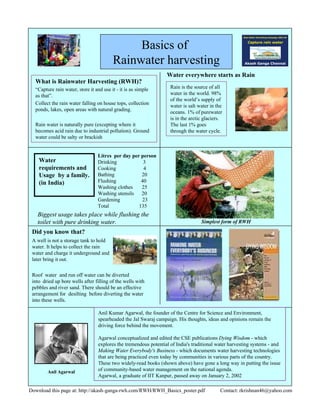
Basics of Rainwater Harvesting
- 1. Basics of Rainwater harvesting Water everywhere starts as Rain What is Rainwater Harvesting (RWH)? “Capture rain water, store it and use it - it is as simple Rain is the source of all as that”. water in the world. 98% of the world’s supply of Collect the rain water falling on house tops, collection water is salt water in the ponds, lakes, open areas with natural grading. oceans. 1% of purewater is in the arctic glaciers. Rain water is naturally pure (excepting where it The last 1% goes becomes acid rain due to industrial pollution). Ground through the water cycle. water could be salty or brackish Litres per day per person Water Drinking 3 requirements and Cooking 4 Usage by a family. Bathing 20 (in India) Flushing 40 Washing clothes 25 Washing utensils 20 Gardening 23 Total 135 Biggest usage takes place while flushing the toilet with pure drinking water. Simplest form of RWH Did you know that? A well is not a storage tank to hold water. It helps to collect the rain water and charge it underground and later bring it out. Roof water and run off water can be diverted into dried up bore wells after filling of the wells with pebbles and river sand. There should be an effective arrangement for desilting before diverting the water into these wells. Anil Kumar Agarwal, the founder of the Centre for Science and Environment, spearheaded the Jal Swaraj campaign. His thoughts, ideas and opinions remain the driving force behind the movement. Agarwal conceptualized and edited the CSE publications Dying Wisdom - which explores the tremendous potential of India's traditional water harvesting systems - and Making Water Everybody's Business - which documents water harvesting technologies that are being practiced even today by communities in various parts of the country. These two widely-read books (shown above) have gone a long way in putting the issue Anil Agarwal of community-based water management on the national agenda. Agarwal, a graduate of IIT Kanpur, passed away on January 2, 2002 Download this page at: http://akash-ganga-rwh.com/RWH/RWH_Basics_poster.pdf Contact: rkrishnan46@yahoo.com
